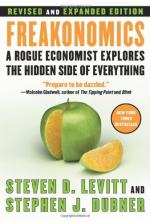|
This section contains 1,198 words (approx. 3 pages at 400 words per page) |

|
Chapter 3 Summary
In Chapter 3, Freakonomics tackles the subject of conventional wisdom and, in providing information from a study about drug dealers, argues that often the conventional wisdom is simply not true. The chapter begins by discussing the concept of conventional wisdom itself, noting that the phrase "conventional wisdom" is first coined by economist John Kenneth Galbraith, who observes that the conventional wisdom "must be simple, convenient, comfortable, and comforting - though not necessarily true." The authors point out that experts often work with journalists to form the conventional wisdom, and very often experts will skew data, and even lie, to serve their own agendas. For instance, in the 1990s, homeless advocate Mitch Snyder testifies before Congress that there are 3 million homeless people in America. The problem with this statistic is that it means that one out of every 100 Americans is homeless, which seemed a bit...
(read more from the Chapter 3 Summary)
|
This section contains 1,198 words (approx. 3 pages at 400 words per page) |

|




